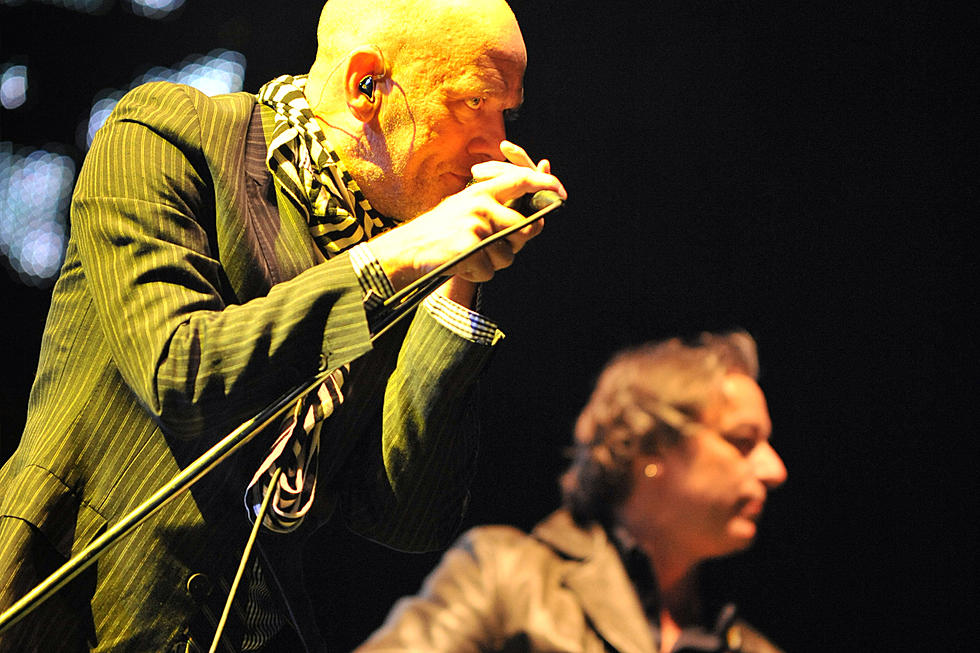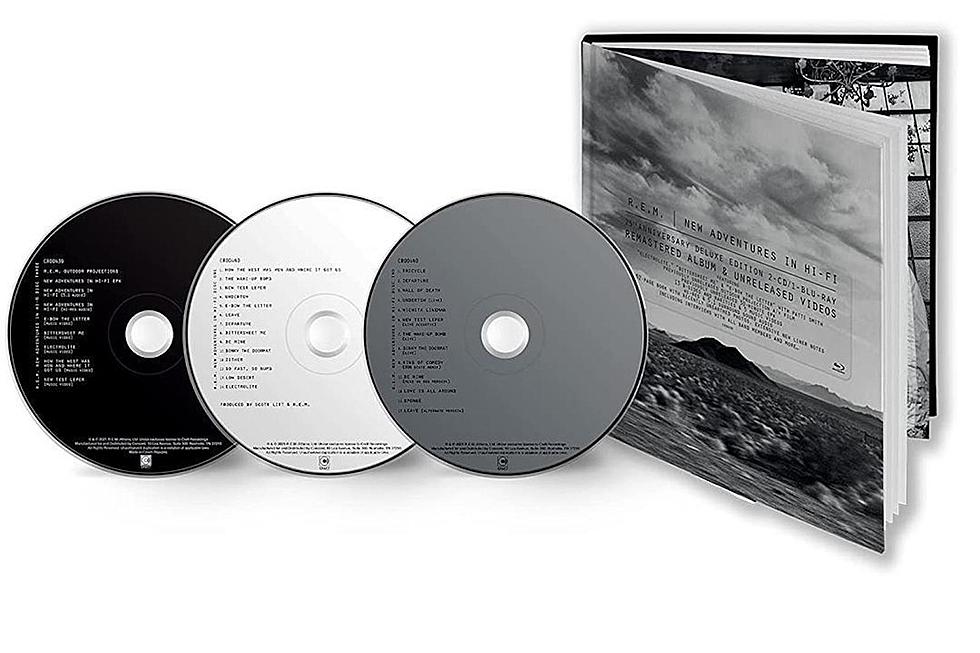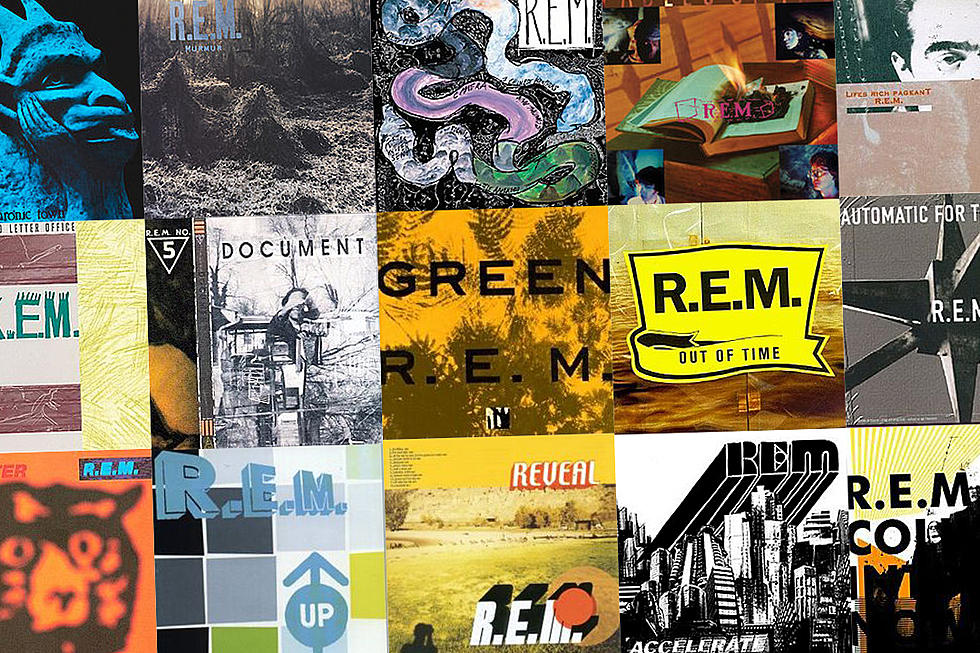
20 Years Ago: R.E.M. Find Their Way as a Trio With ‘Up’
When R.E.M. released their 11th studio album, Up, on Oct. 26, 1998, they sounded like an entirely different band than the one that had released New Adventures In Hi-Fi just two years before.
There's a good reason for that: They were. Drummer Bill Berry had left the quartet about a year before Up's release — a decision he came to as R.E.M. started gearing up to record the album in Hawaii in early 1997. "I just didn't have that same drive to go in and work like I used to," Berry told MTV. "It's hard to describe, but I realized that there was something just very ghastly wrong. I wasn't enthused about it. I thought maybe this was a phase, maybe I don't want to bring this up right now, but months later I felt the same way."
His absence naturally had an impact on how Up sounded, in ways R.E.M. maybe weren't quite expecting. "We were amazed at how much the dynamic of everything changed when Bill left," bassist Mike Mills told Q after the dust had settled. "Even though he wasn’t a studio vulture who sat at the board all day, when he was gone we kept finding ourselves looking for him to say, 'Is this good?' But he wasn’t there, and we didn’t have to."
Instead of opting to replace Berry in the studio, R.E.M. brought in multiple musicians to add instrumental color. In fact, the band used two drummers —Joey Waronker, known for his work with Beck, and Screaming Trees drummer Barrett Martin, who had played with Peter Buck in the side project Tuatara — to handle rhythms and percussion. Scott McCaughey, who was a touring band member on the Monster trek, also contributed keyboards and percussion.
Unsurprisingly, Up featured an expanded instrumental palette, including far more keyboards than any R.E.M. album to date. Although the band was notoriously anti-keyboards earlier in its career, the progression here felt natural. "Why Not Smile" is a twinkly indie-pop gem that gradually adds layers of harpsichord, clicking percussion, piano, keyboards and, finally, triumphant electric guitar, while "Hope" is propelled forward by burbling synths and an insistent, whirring drum machine. (Incidentally, Leonard Cohen was given a songwriting credit on this song because it resembled his own "Suzanne.")
But Up was also marked by dense, layered arrangements, which made songs feel like pastiches. For example, the blocky, off-kilter glam rocker "Lotus" boasts fizzing synths, soulful organ and low, humming strings that buzz around like wasps, while the ominous "Parakeet" has an underbelly roiling with shooting star-like streaks of keyboards, synths and other sounds. Opener "Airportman," an instrumental with soothing chimes and sighing vocals, even felt reminiscent of the instrumental work Brian Eno produced on the landmark Music for Airports.
Watch R.E.M.'s 'Lotus' Video
For the most part, Peter Buck's electric guitars tended to drone rather than come through as riffs, and floated in and out of songs — another bit of color alongside percussion chimes, organ, piano and manipulated sounds. When all of this was paired with arrangements that eschewed the strict rigor of verse-chorus-verse (and mixing from Nigel Godrich, known for helping steer Radiohead's mood pieces), it resulted in quite an experimental album.
"I was playing tracks to friends before Michael put the vocals on, and they were like, 'What is this?'" Buck told Q. "We had Sean O’Hagan from the High Llamas come over to the studio one day. We played him three songs, and after each one he said, 'This is amazingly Krautrock!'
"I hadn’t made a Krautrock connection," Buck added. "But I was tending to think of some of those Eno records, like Before and After Science and Another Green World, where he would have these real human vocals with robotic, cheap drum machines and real drifty keyboards. It would sound like these kind of lullabies, but if you actually analyze what’s going on, it’s all electronic. When I started doing demos for this record, I went into those instruments more in-depth than I ever had – knowing that Michael [Stipe]’s voice was so warm it would ameliorate them."
Indeed, Stipe's vocal performances are front and center throughout, clear as day despite the sometimes-murky music behind him. His voice is manipulated with a metallic tint on "Lotus," and leaps into a delicate, spiraling falsetto on the string-stung "You're in the Air." On "Walk Unafraid" his lead vocals are shaded by Mills harmonies on a later verse, which adds a ghostly effect, while on "Hope," his speak-sing exhortations are sturdy and optimistic. And on the misty single "Daysleeper" — soft-glow jangle-pop that most resembled the "old" R.E.M. — and "At My Most Beautiful," the keening vulnerability to his vocal tone draws listeners in.
Stipe came up with the lyrical thrust of "At My Most Beautiful," a song indebted to the Beach Boys' Pet Sounds that's deeply romantic, while driving in Los Angeles. "I had CDs and tapes of new songs in the car," he told Q. "I came up with this one line: 'I found a way to make you smile.' All I knew was the Beach Boys had a record or song called Smile – is that right? – so I was like, 'Well, this will be my gift to Peter and Mike,' and Bill at the time. It was hard to write. It was a high order to say, 'I found a way to make you smile' – I had to come up with, 'Okay, what are those ways?' That was tough."
In general, Up features some of Stipe's most gorgeous, understated lyrics. "Walk Unafraid" weaves in gentle Biblical references while promoting a message of embracing an offbeat path, while "Hope" lives up to its optimistic title. Many other songs are more uncertain, however, and speak of feeling unsteady, navigating uncharted territory, and asking for atonement. These unsteady themes match Stipe's own creative block after Berry left, and reflect how the band was reconfiguring its identity as a trio.
Watch R.E.M.'s 'Daysleeper' Video
"There are certain things I set out to do," Stipe told Q. "Rough ideas that I wanted to play around with. One of them was the religious versus science-technology-modern-age. There are several songs on the record that, to me, address that. I don’t know how other people are going to take them."
Up peaked at No. 3 on the Billboard Top 200 and was certified gold, while "Daysleeper" was a Top 20 alternative radio hit. ("Lotus," however, peaked at only No. 31 on both the alternative and mainstream rock charts.) Still, the band embarked on a successful world tour in 1999 that kept them on the road for a good chunk of the year — and kept pushing forward into new territory as a creative entity.
In the official press release announcing Berry's departure, Stipe contributed a quote that followed the band for the rest of its career — and also just so happened to summarize Up. "For me, Mike and Peter, as R.E.M., are we still R.E.M.?" he said. "I guess a three-legged dog is still a dog. It just has to learn how to run differently."
Top 100 Rock Albums of the '90s
More From 99.1 The Whale










